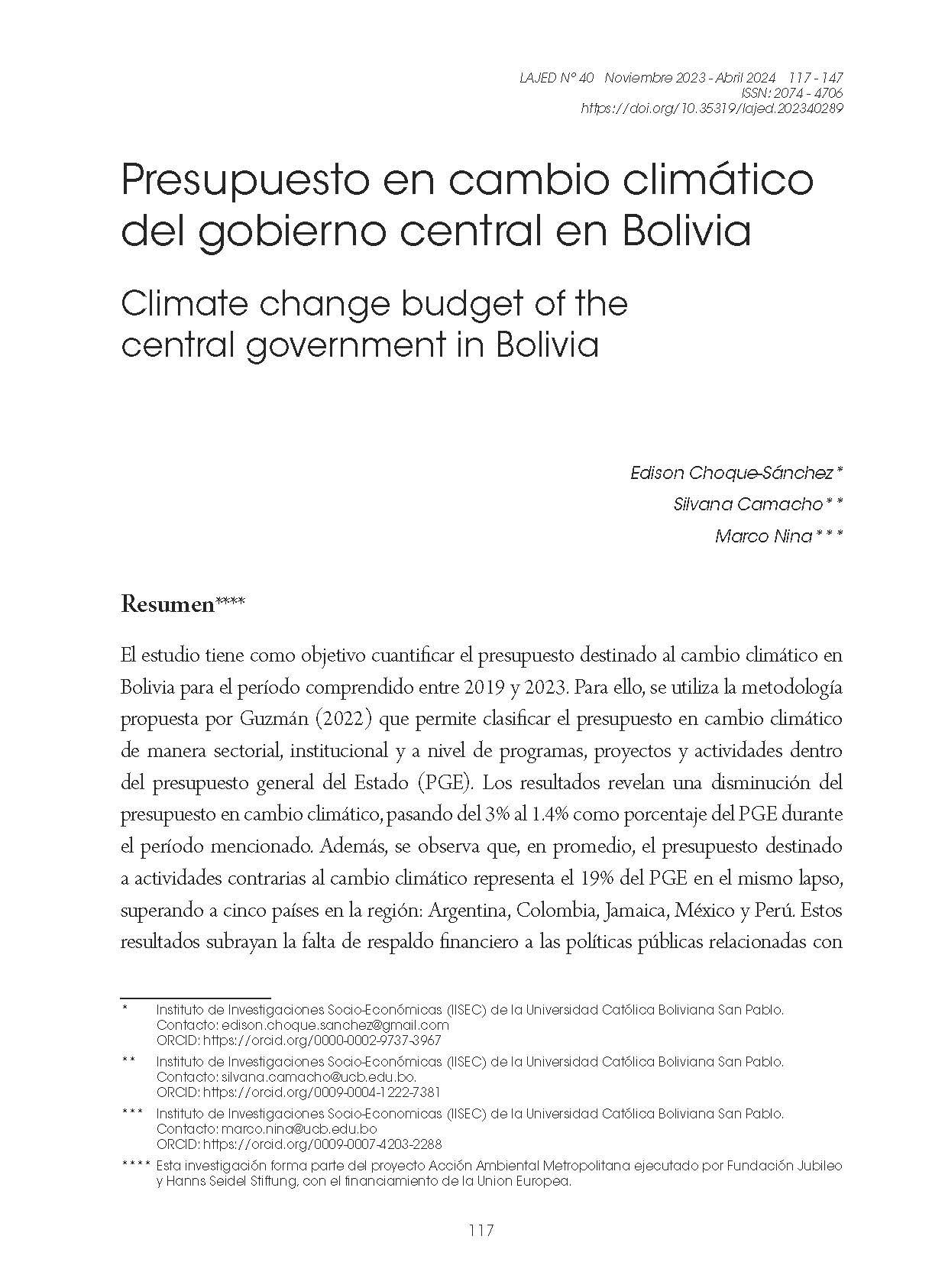Presupuesto en cambio climático del gobierno central en Bolivia
DOI:
https://doi.org/10.35319/lajed.202340289Palabras clave:
Cambio climático, presupuesto público, mitigación, adaptaciónResumen
El estudio tiene como objetivo cuantificar el presupuesto destinado al cambio climático en Bolivia para el período comprendido entre 2019 y 2023. Para ello, se utiliza la metodología propuesta por Guzmán (2022) que permite clasificar el presupuesto en cambio climático de manera sectorial, institucional y a nivel de programas, proyectos y actividades dentro del presupuesto general del Estado (PGE). Los resultados revelan una disminución del presupuesto en cambio climático, pasando del 3% al 1.4% como porcentaje del PGE durante el período mencionado. Además, se observa que, en promedio, el presupuesto destinado a actividades contrarias al cambio climático representa el 19% del PGE en el mismo lapso, superando a cinco países en la región: Argentina, Colombia, Jamaica, México y Perú. Estos resultados subrayan la falta de respaldo financiero a las políticas públicas relacionadas con el cambio climático por parte del gobierno central, mientras que se asigna un presupuesto considerable a sectores económicos contaminantes, como la minería y los hidrocarburos.
Descargas
Citas
Corporación Andina de Fomento, CAF (2022). ¿Qué se juega América Latina en la cumbre del clima (COP 27)? https://www.caf.com/es/actualidad/noticias/2022/11/que-sejuega-america-latina-en-la-cumbre-del-clima/
Escalante, D., Gómez, A. y Choque, E. (2022) Los presupuestos en cambio climático de La Paz, Cochabamba, Santa Cruz y El Alto. Fundación Jubileo. https://jubileobolivia.org.bo/Publicaciones/Revistas-Especializadas/Presupuestos-en-cambio-climatico-demunicipios
Escalante, D., Choque, E. y Gómez, A. (2022). El presupuesto en cambio climático del gobierno central. Fundación Jubileo. https://jubileobolivia.org.bo/Publicaciones/Revistas-Especializadas/El-presupuesto-en-cambio-climatico---Gobierno-Central
Ferro, P., Jaramillo, M., Delgado, R., Almeida, D. y Rodríguez, G. (2020). Climate commitments and national budgets: identification and alignment: case studies of Argentina, Colombia, Jamaica, Mexico, and Peru. IDB Technical Note Nº IDB-TN-01982.
Fundacion Jubileo (2023). Análisis desde la sociedad civil. Actualización de los Compromisos Nacionalmente Determinados de Bolivia. https://cambioclimatico.org.bo/documento/analisis-desde-la-sociedad-civil-actualizacion-de-los-ndc-de-bolivia/
Grupo de Financiamiento Climático para Latinoamérica y el Caribe, GFLAC (2016). Contribución sobre elementos para la construcción de un MRV de financiamiento desde la visión de los países en desarrollo. https://unfccc.int/files/documentation/submissions_from_non-party_stakeholders/application/pdf/501_spanish.pdf
Guzmán, S. (2022). A guide to analyzing the public budget for climate action: A Citizen’s Proposal. GFLAC. https://internationalbudget.org/wp-content/uploads/publicbudget-09-02-22.pdf
Ministerio de Medio Ambiente y Agua (MMAyA) y Autoridad Plurinacional de la Madre Tierra (APMT) (2020). Tercera Comunicación Nacional del Estado Plurinacional de Bolivia ante la Convención Marco de las Naciones Unidas sobre el Cambio Climático. La Paz, Bolivia.
---------- (2022). Actualización de las CDN para el periodo 2021-2030 en el marco del Acuerdo de París. https://unfccc.int/sites/default/files/NDC/2022-06/CND%20Bolivia%202021-2030.pdf
Nordgren, M. (2023). Análisis desde la sociedad civil. actualización de los compromisos nacionalmente determinados por Bolivia. Fundación Jubileo. https://cambioclimatico.org.bo/documento/analisis-desde-la-sociedad-civil-actualizacion-de-los-ndc-de-bolivia/
Pizarro, R., Delgado, R., Eguino, H. y Pereira, A. L. (2021). Marcadores presupuestarios de cambio climático conexiones entre los sistemas de clasificación financiera y ambiental. Documento para la discusión Nº IDB-DP-844. https://publications.iadb.org/es/marcadores-presupuestarios-de-cambio-climatico-conexiones-entre-los-sistemas-de-clasificacion
Rahman, A., Farrok, O. y Haque, M. M. (2022). Environmental impact of renewable energy source based electrical power plants: Solar, wind, hydroelectric, biomass, geothermal, tidal, ocean, and osmotic. Renewable and Sustainable Energy Reviews, 161, 112279.
United Nations Framework Convention on Climate Change (UNFCCC). (2021). The Glasgow Climate Pact. Key Outcomes from COP26. https://unfccc.int/process-and-meetings/the-paris-agreement/the-glasgow-climate-pact-key-outcomes-from-cop26
Villarroel, A., Paz, M., Tejada, F., Lanza, M., Miranda, P., Martínez, R. y Gómez, W. (2015). Informe país de financiamiento para cambio climático: Bolivia. GFLAC. file:///C:/Users/WALTER/Downloads/InformeFinanciamientoBolivia%20(1).pdf
UNDP (2015). A Methodological Guidebook: Climate Public Expenditure and Institutional Review (CPEIR). https://www.asia-pacific.undp.org/content/rbap/en/home/library/democratic_governance/cpeir-methodological-guidebook.html
Word Bank (2021). Climate Change Budget Tagging: A Review of International Experience. EFI Insight-Governance. Washington, DC: World Bank.

Descargas
Publicado
Cómo citar
Número
Sección
Licencia
Derechos de autor 2023 Revista Latinoamericana de Desarrollo Económico

Esta obra está bajo una licencia internacional Creative Commons Atribución-NoComercial 4.0.




